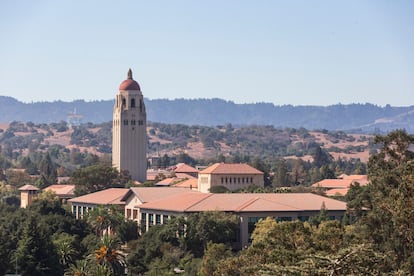Stanford University president announces resignation over concerns about his research
Marc Tessier-Lavigne’s decision comes after the board of trustees launched a review in December following allegations of misconduct around papers he had authored or co-authored

The president of Stanford University said Wednesday he would resign, citing an independent review that cleared him of research misconduct but found flaws in some papers he authored. Marc Tessier-Lavigne said in a statement to students and staff that he would step down Aug. 31.
The resignation comes after the board of trustees launched a review in December following allegations he engaged in fraud and other unethical conduct related to his research and papers.
Tessier-Lavigne, a neuroscientist, says he “never submitted a scientific paper without firmly believing that the data were correct and accurately presented.” But he says he should have been more diligent in seeking corrections regarding his work.
The review assessed 12 papers that Tessier-Lavigne worked on, five of them in which he was the principal author. He said he was aware of issues with four of the five papers but acknowledged taking “insufficient” steps to deal with the issues. He said he’ll retract three of the papers and correct two.
The papers were published before Tessier-Lavigne became Stanford president.
Misconduct allegations about the work were first aired on PubPeer, a website where members of the scientific community can discuss research papers, the report stated.
The panel cleared him of the most serious allegations, that a 2009 paper published in the scientific journal Nature was the subject of a fraud investigation and that fraud was found. There was no investigation and no fraud discovered, the panel ruled. The paper proposed a model of neurodegeneration, which could have great potential for Alzheimer’s disease research and therapy, the panel wrote in its report.
But the panel also concluded the paper had multiple problems, including a lack of rigor in its development, and that the research that went into the paper and its presentation contained “various errors and shortcomings.” The panel did not find evidence that Tessier-Lavigne was aware of the lack of rigor.
Tessier-Lavigne says he’s stepping down because he expects continued debate about his ability to lead the university. He will remain on the faculty as a biology professor. He also said he will continue his research into brain development and neurodegeneration.
The board named Richard Saller as interim president starting September 1, said board chair Jerry Yang.
In a statement, Yang said Tessier-Lavigne was key to creating the university’s first new school in 70 years, the Stanford Doerr School of Sustainability, and in 2019, he unveiled a strategic long-range plan that will continue to guide the university’s growth.
Tessier-Lavigne has been president for nearly seven years.
Sign up for our weekly newsletter to get more English-language news coverage from EL PAÍS USA Edition
Tu suscripción se está usando en otro dispositivo
¿Quieres añadir otro usuario a tu suscripción?
Si continúas leyendo en este dispositivo, no se podrá leer en el otro.
FlechaTu suscripción se está usando en otro dispositivo y solo puedes acceder a EL PAÍS desde un dispositivo a la vez.
Si quieres compartir tu cuenta, cambia tu suscripción a la modalidad Premium, así podrás añadir otro usuario. Cada uno accederá con su propia cuenta de email, lo que os permitirá personalizar vuestra experiencia en EL PAÍS.
¿Tienes una suscripción de empresa? Accede aquí para contratar más cuentas.
En el caso de no saber quién está usando tu cuenta, te recomendamos cambiar tu contraseña aquí.
Si decides continuar compartiendo tu cuenta, este mensaje se mostrará en tu dispositivo y en el de la otra persona que está usando tu cuenta de forma indefinida, afectando a tu experiencia de lectura. Puedes consultar aquí los términos y condiciones de la suscripción digital.








































